Cirincione disagrees that Ukraine’s crisis could have been prevented if Ukraine had kept nuclear weapons.
“Weapons only deter the use of other nuclear weapons,” he said. “They don’t give states the kind of security that some people claim,” he said.
Cirincione said only two states are currently either looking to consolidate as a nuclear state or develop nukes, i.e., North Korea and Iran.
The International Atomic Energy Agency, or IAEA,recently reported Iran has diluted or converted nearly three-quarters of its weapons-grade stockpile, in accordance with the interim deal negotiated with the US, UK, Germany, France, Russia and China.
“There is growing international expectation that we are going to be able to get a deal with Iran by the July 20 deadline set by the interim agreement,” Cirincione. “If that happens, sanctions will start to be lifted and Iran will be open for business again.”
But that still leaves North Korea, which has continued with nuclear tests in defiance of U.S. sanctions and warnings from its only ally, China.
“North Korea already has nuclear weapons,” George Perkovich, director of the Nuclear Policy Program at the Carnegie Endowment for International Peace.
“It has tested them. There are no further arguments they need or would seek to justify whatever it is that they are doing.”
Like Cirincione, Perkovich does not view the crisis in Ukraine as a nuclear threat. He said Russia has nuclear weapon forces and is attaching great status and importance to those precisely because the country has declined in recent years.
“Its economy is in trouble; its demographic situation is negative; its public health situation is negative. So countries in that kind of condition often have parades with missiles and tell their people, ‘Look! We’re great!’” he said.
But Perkovich said that the crisis in Ukraine has a downside: It could make it much harder–both psychologically and politically–for U.S. President Barack Obama and Russian President Vladmir Putin to reduce their nuclear arsenals.
In 2010, Obama and then-Russian President Dmitry Medvedev signed the New START treaty, promising to reduce their stockpiles of nuclear missiles and launchers and commit to a series of annual nuclear inspections, a program that is ongoing.
Pages: 1 2








